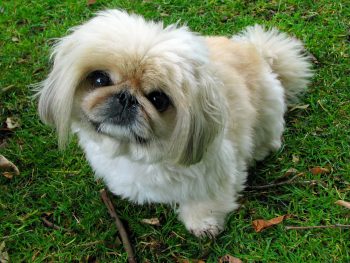The Pekingese, a breed celebrated for its regal and lion-like appearance, demands a grooming regimen that is both thorough and gentle, especially when it comes to ear care. Due to their small size and heavy coat, Pekingese are prone to ear issues, such as infections and wax build-up. Their ears, often covered by a thick fur, can trap dirt, moisture, and debris, leading to discomfort and health problems. Regular ear cleaning is essential to maintain their overall health and to prevent these complications. It not only keeps infections at bay but also allows for early detection of potential issues. Proper ear care is a key component in the well-being of a Pekingese, ensuring they stay healthy and comfortable.
Step-by-Step Instructions for Cleaning a Pekingese’s Ears:
Gather Necessary Supplies: You will need a dog-specific ear cleaning solution, cotton balls or gauze, and treats for rewarding your dog.
Prepare Your Dog: Ensure your Pekingese is calm and comfortable. This will make the cleaning process smoother for both of you.
Inspect the Ears: Gently check the ears for signs of redness, bad odor, discharge, or excessive wax. If you notice any of these symptoms, it’s advisable to consult a veterinarian.
Apply the Cleaning Solution: Squirt the ear cleaning solution into the ear canal, but be careful not to insert the applicator too deep. Massage the base of the ear gently to distribute the solution.
Allow Your Dog to Shake Its Head: After applying the solution, let your Pekingese shake its head. This helps in loosening and expelling the debris from the ear canal.
Wipe Out the Ears: Using cotton balls or gauze, gently clean the outer ear and the accessible part of the ear canal. Avoid probing too deeply into the ear.
Dry the Ears: Make sure the ears are dry after cleaning to avoid moisture buildup, which can lead to infections.
Reward Your Dog: Positive reinforcement with treats and affection will help your Pekingese associate ear cleaning with a pleasant experience.
Frequency of Cleaning: The frequency of ear cleaning for a Pekingese can vary depending on their lifestyle and ear health. Typically, a bi-weekly routine is sufficient, but more frequent cleaning may be necessary for dogs that are prone to ear problems or spend a lot of time outdoors.
Benefits of Regular Ear Cleaning:
Prevention of Infections: Regular cleaning helps prevent the accumulation of wax and debris, reducing the risk of infections.
Early Detection of Health Issues: Routine ear checks during cleaning allow for early identification of issues such as mites, infections, or foreign bodies.
Reduces Odor: Ear cleaning helps control odor that can arise from bacterial growth in the ear.
Enhances Comfort: Clean ears are less prone to irritation, ensuring your Pekingese stays comfortable.
In conclusion, regular ear cleaning is a critical aspect of caring for a Pekingese. It not only helps in maintaining their overall ear health but also enhances their comfort and well-being. Always approach ear cleaning with patience and gentleness, and if there are any signs of ear problems, consult with a veterinarian promptly. Proper ear care is an integral part of the grooming process that keeps your Pekingese happy and healthy.
Frequently Asked Questions About Cleaning A Pekingese’s Ears
The post How to Clean a Pekingese’s Ears appeared first on iHeartDogs.com.

